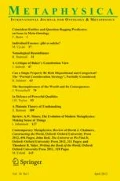Abstract
After presenting a negative characterization of metaphysical vagueness and the main tenets of the view of vagueness as semantic indecision, the paper critically discusses the objection that such a view requires that at least some vagueness not be just constituted by semantic indecision—but rather by the metaphysical vagueness of some semantic relations themselves submitted by Trenton Merricks and, more recently, Nathan Salmon.
Similar content being viewed by others
Notes
Or: that would not issue from semantic indecision nor (vagueness–characteristic) ignorance. Or: that would not issue from semantic indecision nor (vagueness-characteristic) ignorance nor… Regarding epistemicism, see discussion below. A note on terminology. One can decide to reserve talk about ontic or ontological vagueness and vagueness in rebus for when focusing on the issue concerning vague objects specifically. If so, the issue of metaphysical vagueness may well be more general, as the vagueness in question could have other metaphysical sources—say concerning properties and relations, or states of affairs. In this paper, however, I will be using all these locutions interchangeably. Also, I will be taking vagueness to be a particular variety of the more general phenomenon of indeterminacy, characteristically manifested in sorites-susceptibility.
Thus, sharpenings are, strictly speaking, of the language as a whole and not of isolated expressions; see Fine (1975). How to characterize in an explicit satisfactory way the notion of admissible constituted by these connections (possibly among others)—though central to a full defense of the view of vagueness as semantic indecision—is not crucial to our present concerns. Notice that ‘is admissible’ is, of course, itself vague: this is arguably part of what accounts, in this framework, for the phenomenon of “higher-order” vagueness. Complications arising from this will be set aside here.
Andjelković and Williamson (2000) argue, against the view of vagueness as semantic indecision, that (T*) and (F*) suffice for (T) and (F) in the presence of (independent) principles about biconditionals. In López de Sa (2009), I argue that essentially their very same reasons against (T) and (F) as dialectically appropriate formulations of the Tarskian principles suffice for a case against (E1):
$$ {\forall s}{\forall t}{\forall c}\forall P\forall Q\left[ {\left[ {Say\left( {s,c,P} \right)\wedge Say\left( {t,c,Q} \right)} \right]\supset Say\left( {Est,c,P\equiv Q} \right)} \right] $$Most plausibly, they are certainly not precise—but as Merricks observes, their vagueness seems immaterial with respect to the indeterminacy of (1) and (2).
The suppressed material contains the parenthetical: “(Or one could hold that ‘describes’ expresses no relations, but would express one relation if precisified in one way, another if precisified in another, and so on. This sort of variation is irrelevant to substance of my argument.)” See discussion below, where I will be claiming that it is crucially relevant to vindicate the response on part of the defender of the view of vagueness as semantic indecision.
References
Andjelković M, Williamson T (2000) Truth, Falsity, and Borderline Cases. Philosophical Topics 28: 211–43.
Barnes E (2010) Ontic vagueness: A guide for the perplexed. Nous 44: 601–27.
Barnes E, Williams JRG (2011a) A theory of metaphysical indeterminacy. In: Bennett K, Zimmerman DW (eds) Oxford Studies in Metaphysics 6. Oxford University Press, Oxford.
Barnes E, Williams JRG (2011b) Response to Eklund. In: Bennett K, Zimmerman DW (eds) Oxford Studies in Metaphysics 6. Oxford University Press, Oxford.
Eklund M (2011) Being metaphysically unsettled: Barnes and Williams on metaphysical indeterminacy and vagueness. In: Bennett K, Zimmerman DW (eds) Oxford Studies in Metaphysics 6. Oxford University Press, Oxford.
Fine K (1975) Vagueness, truth and logic. Synthèse 30: 265–300.
Hawley K (2001) How Things Persist. Oxford University Press, Oxford.
Keefe R (2000) Theories of vagueness. Cambridge University Press, Cambridge.
Keefe R (2010) Supervaluationism, indirect speech reports, and demostratives. In: Dietz R, Moruzzi S (eds) Cuts and Clouds: Vagueness, Its Nature and Its Logic. Oxford University Press, Oxford.
Lewis D (1986) On the Plurality of Worlds. Blackwell, Oxford.
López de Sa D (2009) Can one get bivalence from (Tarskian) truth and falsity? Canadian Journal of Philosophy 39: 273–82.
López de Sa D (2013). What could vague objects possibly be? In: Akiba K, Abasnezhad A (eds) Vague Objects and Vague Identity. Springer, Dordrecht, Heidelberg, New York, London. Forthcoming
Merricks T (2001) Varieties of vagueness. Philosophy and Phenomenological Research 62: 145–57.
Salmon N (2010) Vagaries about vagueness. In: Dietz R, Moruzzi S (eds) Cuts and Clouds: Vagueness, Its Nature and Its Logic. Oxford University Press, Oxford.
Williamson T (1994) Vagueness. Routledge, London.
Acknowledgments
I presented an earlier version of this material for the Arché Academic Audit in St Andrews, June 2007. Then and there the Arché Vagueness Conference also took place, at which Rosanna Keefe commented on a version of Salmon’s paper. Although these were independent from each other, my thinking about these matters has been greatly influenced by her work on these issues, in particular Keefe (2000, 2010). Thanks to participants in these events and in the LOGOS Seminar, and in particular to Aurélien Darbellay, Manuel García-Carpintero, Miguel A Sebastián, Crispin Wright, Elia Zardini, and, specially, Rosanna Keefe. Research has been partially funded by FFI2008-06153, FFI2012-35026, and CSD2009-0056 (Gobierno de España); 2009SGR-1077 (Generalitat de Catalunya); and ITN FP7-238128 (European Community).
Author information
Authors and Affiliations
Corresponding author
About this article
Cite this article
López de Sa, D. Vagueness as Semantic Indecision: Metaphysical Vagueness vs Indeterminate Reference. Int Ontology Metaphysics 14, 197–209 (2013). https://doi.org/10.1007/s12133-013-0121-6
Published:
Issue Date:
DOI: https://doi.org/10.1007/s12133-013-0121-6




